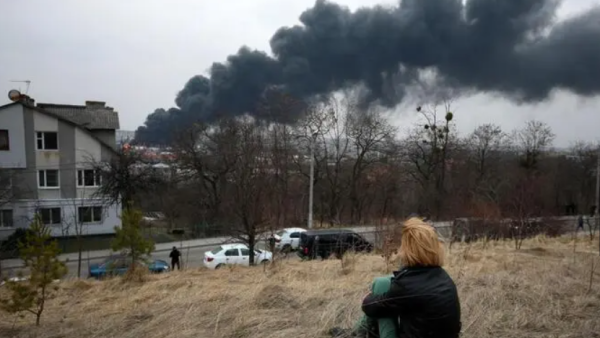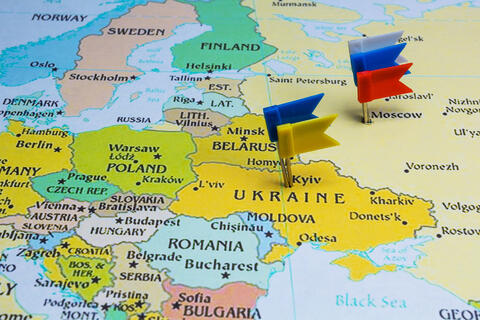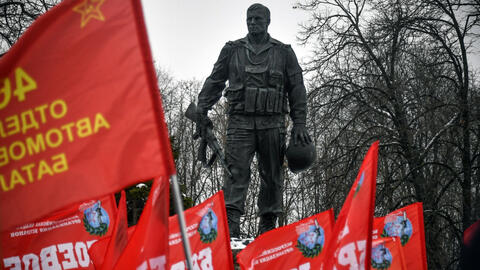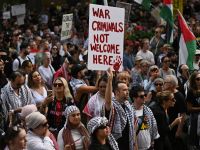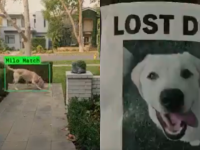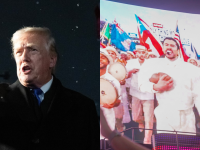By Farzad Ramezani Bonesh
When ordered, the Ukraine War or Russian military invasion of Ukraine began on (February 24, 2022), following the Russian troops entering Ukraine, by the order of Vladimir Putin. Many analysts expected Kyiv to fall in less than a week. But little by little, the process of the developments changed.
In fact, a combination of various internal factors, such as the patriotic defense and resistance of the Ukrainian army, the highlighting of some weaknesses of the Russian army, the sending of more military and security aid by Western allies to Ukraine, practically prolonged the war.
Although Russian forces have so far occupied large swathes of Ukrainian territory, Ukrainian resistance and counterattacks are continuing.
In the meantime, President Volodymyr Zelensky explained on March 25 as “We believe in victory.” In fact, Russia's military approach and recent statements about reducing attacks on Kyiv are the beginning of another turning point and a new situation in the Ukraine-Russia crisis and war.
Important and influential variables on the continuation of the crisis in Ukraine
Any continuation of the Ukraine crisis depends on domestic, regional and international factors and variables.
Economy:
In the wake of the Russian invasion, many governments, including the United States, passed a range of sanctions, including the removal of Russian banks from the (Swift) global financial system and a ban on Russian oil and gas imports from Russia. The sanctions also met with Moscow's retaliatory measures, affecting the flow of global goods and services. In fact, economic sanctions and the conditions of the Ukrainian war are also very harmful to the Russian economy. As estimated, a complete shutdown of gas supplies to Europe also costs Gazprom and Russia more than $ 200 million a day.
Sanctions and war have also had and will continue to have dire consequences, such as the decline in world GDP in 2022. These sanctions could lead to higher inflation, increased financial market volatility, tighter monetary policy and supply chains. Therefore, it can have a serious impact on the scope of choosing actors involved in the crisis.
Russian attitude
Ukraine is important for Russia, in terms of political, economic, cultural, and nostalgic dimensions. The supporters of Russia, Orthodoxians, and Russian-speakers in Ukraine have cultural, religious, and linguistic ties to Russia. Russia's strategy and national security documents emphasize the strategy of not letting NATO’s expansion to Russia's neighbors. Therefore, trying to reach NATO and Ukraine's growing European identity is a threat to Russia. This is one of the important points of difference between the two countries. In fact, if Moscow's insistence on receiving a guarantee of preventing Ukraine to become a NATO member, Russia's right to veto foreign policy choices of its neighbors which are not members of NATO, the reduction of NATO security and defense relations with Ukraine, non-delivery of modern weapons and strategic consultations, etc. continue, practically the continuation of crisis and war is also a way to pursue goals.
Although Moscow does not want to suffer much damage to its national security, the strategic interests of its geopolitical inquiry, it simply does not consider software levers such as dialogue and consultation to be sufficient. In the meantime, in the eyes of many, despite Russia's failures in Ukraine (7,000 to 15,000 war casualties and more than 1,500 military vehicles); they consider the first phase of the operation generally accomplished. However, increasing battlefield casualties, vulnerability to drones, declining air superiority, and counter-attacks by the Ukrainian armed forces could affect the attitude or shift of major operational directions to south and east, or access to the peace. In fact, although the superiority of the Russian military has not changed, the intense resistance of Ukraine has increased the danger of the swamp for Russia.
In another dimension, however, Putin has consolidated his power at home and neutralized political opponents with approaches such as punishing the new law for spreading false news. But the political, economic and security consequences of the war inside Russia and accusations such as Russia's war crimes in Ukraine could affect the Kremlin's view of Ukraine. Russia, meanwhile, may be trying to use the card of more important military achievements or the siege of Ukrainian forces in peace talks.
Ukrainian attitude
In general, the continued widespread military damage of war may lead to changes in the major actors' attitudes toward goals and interests. Meanwhile, in addition to the humanitarian catastrophic pressure on more than 4 million Ukrainian refugees, the presence of at least 7 million internally displaced persons, any withdrawal from NATO membership and a reduction in conflict with Moscow could affect the status quo or cessation of hostilities.
Ukrainian President Volodymyr Zelensky has previously said his country is ready for a Russian hybrid war. In fact, though, the military has strengthened and Western allies have increased their equipment and supplies to Ukraine, but the fact is that in a long battle without a definite conclusion, with widespread destruction, and the development of a civil guerrilla war, Ukraine will be the main loser. Therefore, there is a possibility of changing the attitude towards conceding concessions to Russia and achieving peace with Moscow.
Global institutions and actors
Aside from some military aid, such as the US military aid package to Ukraine, the major Western and developed powers are reluctant to intervene directly in the Ukraine war. However, institutions such as the United Nations, the G7, the European Union, and other countries continue to condemn Russia's actions and support for Ukrainian forces, or call on Russia to stop using force in Ukraine. Among such variables as Russia's border with three NATO members, Russia's nuclear readiness state, "no-fly zone" plan, the risk of civil war, and the risk of proxy war, the refugee crisis can affect the effectiveness of global institutions and actors in the Ukraine crisis.
For example, in the first place, the costs of military and armament support, economic support and the reception of a large wave of refugees to Europe in the Ukraine war will be a heavy burden on Europe. The Chinese government will also be on Russia's side, but not enough to impose sanctions on it. Therefore, it wants to stabilize the conditions and possible participation in mediation.
In fact, negotiations between Russia and Ukraine began only a few days after the start of the war. Peace talks on humanitarian action, ceasefire and neutrality have significantly increased the chances of an agreement. In this regard, the plan of a meeting between the leaders of the two countries, mediated by foreign actors, can certainly reduce the scope of tension.
Future scenarios
The war in Ukraine has global consequences. In the meantime, looking at the future, several scenarios could be under consideration.
Possible scenarios:
A. Win-win peace agreement: The two sides are likely to move towards "diplomacy" and to reduce tensions and meet some of each other's demands. Increased pressure on both actors and the negative consequences of continuing the war could also lead to a peace agreement to end the war.
This requires a rapprochement on Ukraine's declaration of neutrality, acceptance of Crimea's accession to Russia and Donbass independence, lifting of sanctions, and so on.
B. The partition of Ukraine and the Korean model: The continuation of the war and the lack of a decisive victory of both actors can lead to the division of Ukraine, as in the model of North and South Korea. Russia could form an integrated and connected belt from southwestern Ukraine on the Black Sea, east, northeast to north of Ukraine (Belarus border), and turn these regions to its ally. The Dnieper River can act as a border line.
C. Prolongation and erosion of the war: A variety of factors and causes can lead to proxy war and the continuation and erosion of the war inside Ukraine.
Unlikely scenarios:
A. A coup, and the creation of a pro-Russian state in Ukraine, along with the complete victory of Russia, and the complete occupation of Ukraine and the fall of the Ukrainian government, can be considered as unlikely scenarios.
B. In another unlikely scenario, the use of chemical weapons, nuclear attack and the reaction of the West and NATO could lead to World War III.
C- Another unlikely scenario is that the total collapse of the Russian economy and the erosion of its power in Ukraine could lead to a complete defeat of Russia in Ukraine.


